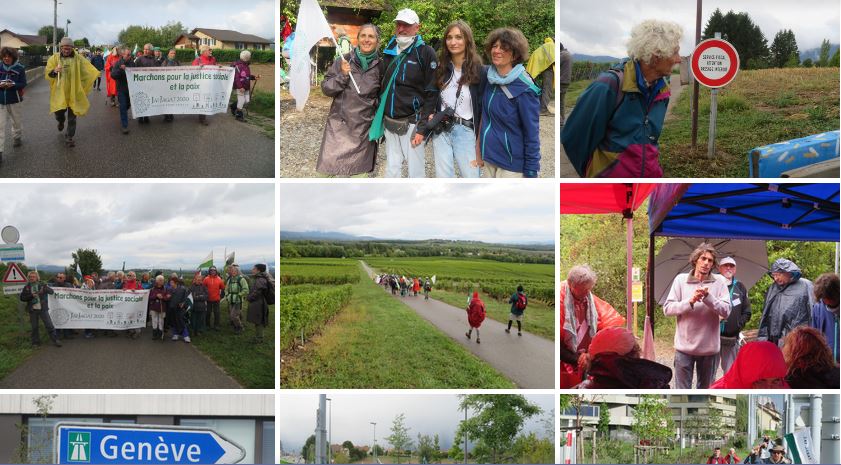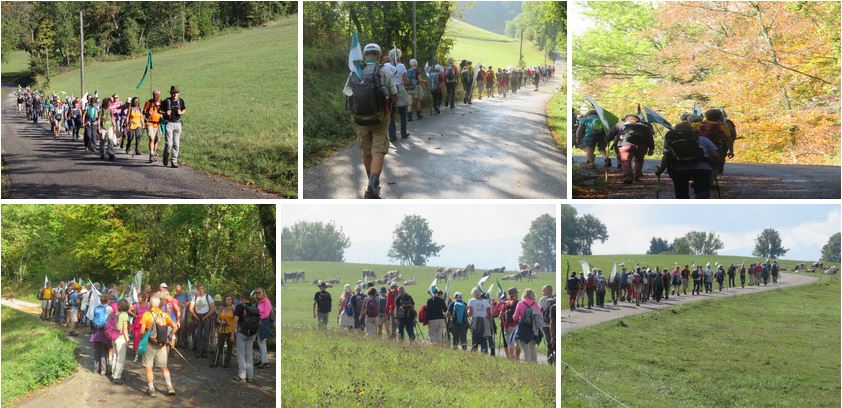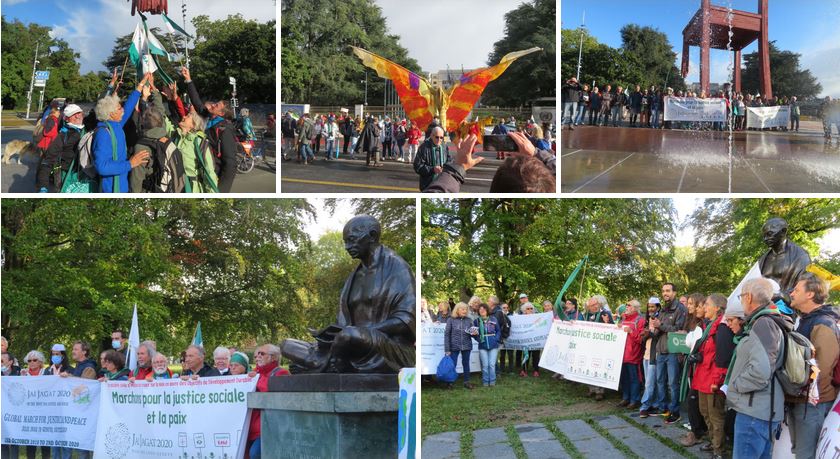The idea started in India, where several successful marches had already been organised to call for land credits for peasants deprived of their lands, in the spirit of the nonviolent marches initiated by Gandhi.
In view of the insufficiency of the credits allotted, the Ekta Parishad movement led by Radjagopal aimed at addressing the highest courts, and decided to make a global effort by means of international marches converging together at the UN centre in Geneva to arrive on 26 September 2020 (the official World Day for the Abolition of Nuclear Weapons).
The purpose was to incite civil society to mobilise to demand the implementation of the 17 Sustainable Development Goals, which were signed in 2015 by 193 countries, to be attained by 2030. (Cf. https://www.un.org/sustainabledevelopment/fr/objectifs-de-developpement-durable/)
Four of these goals are the main ones supported by Jai Jagat :
• N° 1 : to eliminate poverty
• N° 13 : to fight against climate change
• N°10 : to reduce inequalities
• N° 16 : peace, justice and effective institutions
Concerning goal 16 focused on peace, which is ACDN’s primary subject, it is worth noting that the arms trade and investments in means of mass destruction are not denounced, or even documented.
I took part in the march from Lyon to Geneva from 12 September to 26 September to carry ACDN’s message (appended below) to the UN. I wished also to denounce the cynical way in which our leaders sign on to ambitious goals for tomorrow which are destined to be mere pious hopes unless there is a mass mobilisation of civil society.
Unfortunately, the march which left New Delhi in October 2019 was forced to stop in Armenia in April 2020 on account of the coronavirus. The French marches were the only ones maintained.
The rich encounters, the warm welcomes on each stage, along with the presentation of local initiatives for a world of greater humanity and solidarity - these strengthened my hopes and above all my conviction that solutions will come only from below, and this requires the resolute and unshakable commitment of as many people as possible.
Here is the link for the travel notebook that one of us made, with commentaries and photos, some of which illustrate this article.
And this links to a 14’ video and photos taken by Martin, who was delegated by Jai Jagat International and accompanied us on the final days. At the end of the video, you will admire the magnificent birds of peace which welcomed us in Geneva.
It was a beautiful experience, rich in meetings within the group of some forty people who, like me, walked the full 210km, plus 70 others who walked part of the way: numerous beautiful people committed to various causes: the welcoming of migrants, popular education, international volunteers in peace brigades, activists for political nonviolence, a campaigner for forests, a defender of bio farming, peasants, beekeepers, unemployed people, retirees, people on sabbatical leave, lovers of life aged from 27 to 86...So much happiness!
Since returning, I am busy preparing the film-debate « Bons baisers de Moruroa » here attached, which is scheduled for Sunday 11 October at 4pm - I will maybe have the pleasure of seeing some of your readers there.
Thank you for reading down to here!
François MICHIELS
Translation : Peter LOW

***
Sustainable Development Objectives
"Objective 16 : Peace, justice and effective institutions"
(Contribution of ACDN)
"Conflict, insecurity, weak institutions and limited access to justice remain a great threat to sustainable development.”
To focus on ’the true fight’, UN Secretary-General António Guterres called for "a global ceasefire, in an appeal urging warring parties across the world to lay down their weapons in support of the bigger battle against the COVID-19 pandemic."
The UN Secretary-General’s call rightly stresses the fact that the continuation of wars hampers the mobilisation of states and peoples in the struggle against the pandemic. This valid point is true also for all the other scourges that humankind has to face, all of which justify each of the 17 Sustainable Development Objectives.
To reach all these objectives, humankind holds a crucial tool: disarmament. For weapons of war have a doubly negative effect. On the one hand they fuel wars - current and future wars - which kill or wound people and destroy their environment. On the other hand, they divert huge financial, material and human resources away from being used positively in the service of "sustainable development."
For these reasons, disarmament needs to concern "conventional" weapons, and also those called "weapons of mass destruction", in particular nuclear arms which are weapons for crimes against humanity according to UN Resolution XVI of 24 November 1961. They are radically contrary to humanitarian law. They flout simultaneously the UN Charter and the most elementary rules of democracy, because the earth’s people, who are the targets of nuclear arms, have absolutely no decision-making power in respect of them.
At any moment nuclear weapons can - by accident, information or calculation error, or by the will, fear or folly of a single leader - cause millions of victims. As President Kennedy said at the General Assembly on 25 September 1961: "Let us abolish these weapons before they abolish us!"
The citizens of countries with these arms pay for them to be built and maintained, yet have never been consulted. They will be consulted even less when a decision might be made to use them. At no point, therefore, have they had, do they have, or will they have a say in this matter, either as potential victims or as accomplices in crimes against humanity. That is the case of the French people who nevertheless, according to polls, are overwhelmingly in favour of France negotiating with the other nuclear states with a view to abolishing nuclear and radioactive weapons, in conformity with Article VI of the Non-Proliferation Treaty (NPT) which France joined in 1992. The French people need to be able to have their say by referendum. And the other peoples also need to see their views prevail, in one way or another.
Since the NPT entered into force in 1970, the three nuclear states that drafted it and the two nuclear states that later joined it have flouted the commitment they made under Article VI to eliminate all their nuclear weapons. This behaviour incites other states to obtain them. In this way we are racing towards a catastrophe. According to the Bulletin of Atomic Scientists, we are at 100 seconds from an apocalypse which would make the Covid-19 pandemic pale into insignificance.
It is therefore urgent that the earth’s peoples take hold of this question and impose their opinion. "Not a prayer but an order must now rise from the peoples to their governments, the order to choose definitively between hell and reason," wrote Albert Camus on 8 August 1945, just after the bombing of Hiroshima. That is still true now 75 years later, at a time when fewer than a dozen heads of nuclear states are holding the fate of humanity in their hands.
The United Nations, aiming to improve the governance of the world, needs to contribute to abolishing the worst governance of all: nuclear governance, which is terror and dictatorship. The UN needs to demand that the earth’s peoples have their say and disarm for the sake of life. The Charter proclaims that each human being has a right to life. The UN needs to proclaim in addition the right for peoples to survive - and this right requires the abolition of nuclear and radioactive weapons. Without this vital measure, all efforts directed against climate degradation and in favour of "sustainable development" risk failing or being destroyed.
ACDN

